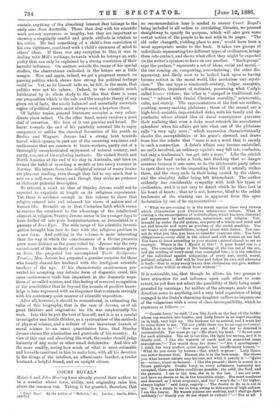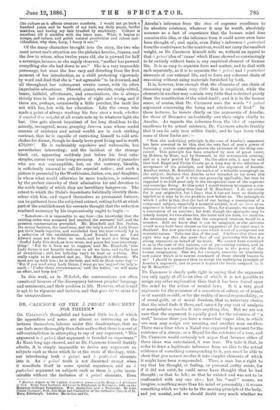COURT ROYAL.*
Mehalah and John Herring have already proved their author to be a novelist whose force, ability, and originality raise him above the common run. Taking it for granted, therefore, that • Court. Royal. By the Author of " Mebalah," &c. Loudon: Smith, Elder, and Co., no recommendation here is needed to ensure Court Boyars being included in all orders to circulating libraries, we proceed straightway to specify its purpose, which will also give some
sort of notion of the people to be met with in its pages. "The old order changeth, yielding place to new," would have been a most appropriate motto to the book. It takes two groups of individuals representing two different types of civilisation, brings them into contact, and shows what effect they might be expected (in the writer's opinion) to have on one another. "Each group," says the preface, "represents a set of ideas, social and moral,— the one coming on, conquering, overwhelming ; the other dis- appearing, and likely soon to be looked back upon as having become extinct in the moral world, like asceticism and mysti- cism." The one type is nineteenth-century, vulgar, energetic,
self-assertive, impatient of restraint, possessing what Carlyle called beaver virtues ; the other is "steeped in traditional cul-
ture," "infused with feudal Christian morality," aristocratic, calm, and stately. The representatives of the first are restless, pushing, money-making plebeians ; those of the second are a high-bred, amiable, impoverished duke, with his family and de- pendants, whose absurd idea of ducal consequence prevents their realising that even a duke must retrench his accustomed splendour when his affairs get into what one of the plebeians calls "a very ugly mess ;" which expression characteristically shocks the susceptibilities of his grace's steward, and draws from him the rebuke that "mess is not a word that is seemly in such a connection. A duke's affairs may become embroiled, an earl's involved, an ordinary squire's may fall into confusion, but only a tradesman's can get into a mess." Like the ostrich putting its head under a bush, and thinking that no danger menaces because it sees none, so do the aristocratic party refuse to open their eyes to the impending blow till it actually strikes them, and the story ends in their being ousted by the others, and the almighty dollar being left triumphant. The author evidently has considerable sympathy with both his types of civilisation, and it is not easy to detect which he likes best in his heart of hearts ; that be is not, however, blind to the selfish tendencies of the winning one is apparent from this open declaration by one of its representatives :—
" Wbat we are coming to is the revolt against these very virtues which characterise your Christian aristocratic culture. What is coming is the emancipation of individualism, which has been distorted and suppressed by self-restraint, submission, and religion. You, brought up under the old system, are parts of a whole, and think and act and breathe and move as portions of the social machine. You are bound with responsibilities, hedged about with duties. You can- not do what you like, you have to consider everyone else. You have obligations to every child in the school and sick woman on her bed. You have to dress according to your station ; attend church to set an example. Where is the I Myself in this ? A poor bound lion in a net. The coming change i8 the bursting of the lion out of the net, and the rending of every mesh that entangled him ; it is the rebellion of the individual against obligations of every sort, social, moral, political, religious. Self will be free and follow its own will wherever it leads—free to enjoy every luxury that civilisation can give, without scruple from within or check from without.'"
It is noticeable, too, that though be allows his two groups to have attraction for and influence upon each other to some extent, he yet does not admit the possibility of their being amal- gamated by marriage ; for neither of the attempts made in that direction come to anything, and a very brief experience of being engaged to the Duke's charming daughter suffices to impress one of the vulgarians with a sense of class-incompatibility, which he expresses as follows :—
" Cousin Lucy,' he said, I am like Jacob at the foot of the ladder whose top reaches into heaven, and Lady Grace is an angel standing on it high, very high up. She beckons me to ascend, and I want her to come down to me. Till one yields there can be no rapprochement. Which is it to be ? '= How can you ask ? For her to descend is
inconceivable. You must go up.'—He shook his head. do not care for such altitudes. The air is too thin, the light too strong, and it is deadly cold. I like the warmth of earth and its somewhat crass atmosphere.'—' You would drag her down ! Am I sacrilegious ? I think her very perfect, quite angelic, but insufficiently human?— ' What do you mean by human—that which is gross ? Lady Grace can never become that. Human she is in the best sense. She shows you what human nature may become, not what it usually is.'—' Quite so—nature, about-to-become. I like the present ; there is unrest in a future participle. Cousin Lucy, to every substance, humanity not excepted, there are three conditions possible : the solid, the fluid, and the gaseous. I am in the first, she is in the last. I am not even, and have no desire to be, in the transition stage. She must condense and descend, or I must evaporate and that I won't do.'—' Go higher, always higher ! ' said Lucy, eagerly.—' The desire to do so is not in me. It is a strain to me to keep awing in this region of high culture. I am like Icarus. My waxen pinions are melting, and I shall go down suddenly.'—' Surely you do not object to culture ? Not at all. I like culture as it affects creature comforts. I would not go back a hundred years and be bereft of my bath, my daily paper, lucifer matches, and having my hair brashed by machinery. Culture is excellent till it meddles with the inner man. When it begins to scrape, and reduce, and polish natural proclivities and robust indi- vidualities, why then, Lucy, I fancy it not.'"
Of the many characters brought into the story, the two who most arrest one's attention are the plebeian heroine, Joanna, and the Jew to whom, when twelve years old, she is pawned for half a sovereign,because, as she sagely observes, "mother has pawned everything else she had down to me." She is a very impossible personage, but none the less racy and diverting from the first moment of her introduction, as a child protesting vigorously by word and deed that she is "not agreeable " to be drowned, and all throughout her subsequent erratic career, with its often improbable adventures. Shrewd, quaint, resolute, ready-witted, brave, faithful, affectionate, and conscientious, she is always strictly true to her own principles of right and wrong, and if these are, perhaps, occasionally a little peculiar, the fault lies not with her, bat with her education. Like the sweep who made a point of always washing his face once a week, whether it wanted it or not, she at all events acts up to whatever light she has. One gets almost impatient of her long thraldom to the miserly, revengeful, mean, grasping Jew—a man whose sordid manner of existence and actual wealth are in such striking contrast, that he is capable of restricting himself to cold arti- chokes for dinner, though he dearly loves good living and is worth £70,000! He is undeniably repulsive and unloveable, but nevertheless interesting; and the incident of the strange black cat, appearing suddenly just before his final cata- strophe, comes very near being uncanny. A picture of parasites who are not contemptible, but, on the contrary, likeable, is sufficiently unusual to call for especial notice ; and such a picture is presented by the Worthivales, father, son, and daughter, in whom what would otherwise be mere toadyism, is redeemed by the perfect sincerity of their admiration for and devotion to the noble family of which they are hereditary hangers-on. The extent to which the Duke's dependants habitually identify them- selves with him, and regard themselves as permanent fixtures, can be gathered from the subjoined extract, setting forth at which part of the establishment his servants thought that the reduction rendered necessary by his impecuniosity ought to begin :—
"Somehow—it is impossible to say how—the knowledge that the existing order was menaced had reached the servants' hall, and the greatest consternation prevailed. Mr. Blomfield and Mrs. Probes, the senior footmen, the coachman, and the lady's-maid of Lady Grace put their heads together, and concluded that the true remedy lay in a reduction of the establishment. Lord Ronald must go. Lord Edward must not be there so much, and he must not bring that drefful Lady Elizsbeth, as is so mean, and pokes her nose into every- thing.' 'Far be it from we to suggest,' said Mr. Blomfield, that Lady Grace is not heartily welcome to all we have, and to the best of everything ; still, her ladyship can't be kept on nothing. She really ought to be married and go. The Marquis is different. We must put up with him ; he is the heir, and will be Dook some day.'— 'But if you send away Lady Grace, I must go too,' argued the lady's. maid.—' Under those circumstances,' said the butler, we will make an effort, and keep her.'"
In this work, as in Mehalall, the conversations are often unnatural because of the discrepancy between peoples' language and sentiments, and their position in life. However, what is said is apt to be vigorous and incisive, and that goes far to atone for the unnaturalness.



































 Previous page
Previous page